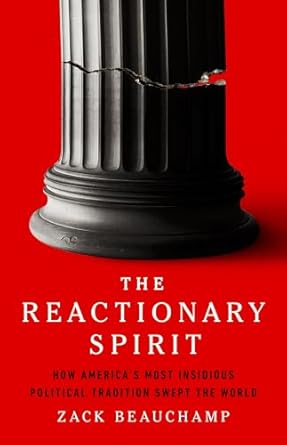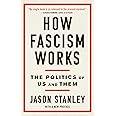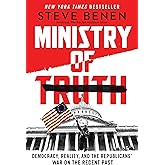
Download the free Kindle app and start reading Kindle books instantly on your smartphone, tablet, or computer - no Kindle device required.
Read instantly on your browser with Kindle for Web.
Using your mobile phone camera - scan the code below and download the Kindle app.



 Audible sample
Audible sample The Reactionary Spirit: How America's Most Insidious Political Tradition Swept the World Hardcover – July 16, 2024

Explore your book, then jump right back to where you left off with Page Flip.
View high quality images that let you zoom in to take a closer look.
Enjoy features only possible in digital – start reading right away, carry your library with you, adjust the font, create shareable notes and highlights, and more.
Discover additional details about the events, people, and places in your book, with Wikipedia integration.
Purchase options and add-ons
There is a fundamental contradiction at the heart of American politics that has endured since our nation’s birth. In The Reactionary Spirit, Zack Beauchamp explains what he calls the reactionary spirit: as strides towards true democracy are made, there is always a faction that reacts by seeking to undermine them and thereby resist change.
Brilliantly combining political history and reportage, Beauchamp reveals how the United States was the birthplace of this strange and harrowing authoritarian style, and why we’re now seeing its evolution in diverse nations including Hungary, Israel, and India.
The Reactionary Spirit paints a vivid, alarming picture that illuminates not only what’s happening to democracy globally, but also what we must do to protect it—while we still can.
- Print length272 pages
- LanguageEnglish
- PublisherPublicAffairs
- Publication dateJuly 16, 2024
- Dimensions6.35 x 0.94 x 9.65 inches
- ISBN-10154170441X
- ISBN-13978-1541704411
Book recommendations, author interviews, editors' picks, and more. Read it now
Frequently bought together
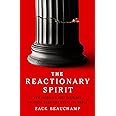
Customers who bought this item also bought
 Stolen Pride: Loss, Shame, and the Rise of the RightHardcoverFREE Shipping on orders over $49 shipped by AmazonGet it as soon as Friday, Jan 17
Stolen Pride: Loss, Shame, and the Rise of the RightHardcoverFREE Shipping on orders over $49 shipped by AmazonGet it as soon as Friday, Jan 17 Autocracy, Inc.: The Dictators Who Want to Run the WorldHardcoverFREE Shipping on orders over $49 shipped by AmazonGet it as soon as Friday, Jan 17
Autocracy, Inc.: The Dictators Who Want to Run the WorldHardcoverFREE Shipping on orders over $49 shipped by AmazonGet it as soon as Friday, Jan 17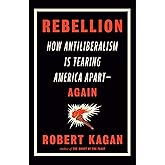 Rebellion: How Antiliberalism Is Tearing America Apart--AgainHardcoverFREE Shipping on orders over $49 shipped by AmazonGet it as soon as Saturday, Jan 18Only 1 left in stock - order soon.
Rebellion: How Antiliberalism Is Tearing America Apart--AgainHardcoverFREE Shipping on orders over $49 shipped by AmazonGet it as soon as Saturday, Jan 18Only 1 left in stock - order soon.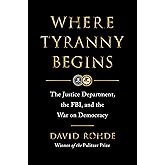 Where Tyranny Begins: The Justice Department, the FBI, and the War on DemocracyHardcoverFREE Shipping on orders over $49 shipped by AmazonGet it as soon as Friday, Jan 17
Where Tyranny Begins: The Justice Department, the FBI, and the War on DemocracyHardcoverFREE Shipping on orders over $49 shipped by AmazonGet it as soon as Friday, Jan 17
From the Publisher




Editorial Reviews
Review
“Beauchamp’s always insightful exploration of the overlap between ideology and politics shines here as he unpacks how American democracy contains within it an impulse for self-destruction. A must-read for anyone who wants to understand the different stages of democracy’s life-threatening illness in Hungary, Israel, India, and the United States, along with a prescription for nursing democracy back to health.”―Heather Cox Richardson , author of Democracy Awakening
“Beauchamp’s trenchant analysis of the reactionary spirit—a political mindset that sees democracy as a threat to be abolished—is a timely and vital contribution to our understanding of the myriad antidemocratic movements threatening our freedoms today.”―Ruth Ben-Ghiat, author of Strongmen
“The Reactionary Spirit is an insightful and absorbing read that traces the distinction between traditional conservatism and the antidemocratic ideology that threatens democracies across the world. Beauchamp wields both history and social science to illustrate the origins of this neoreactionary sentiment and how it camouflages itself using the democratic rhetoric of the liberal societies it aims to annihilate.”―Adam Serwer, staff writer, Atlantic
“A conscientious peeling away of the false democratic facade of contemporary authoritarianism.”―Kirkus
About the Author
Before coming to Vox, he edited TP Ideas, a section of ThinkProgress devoted to the ideas shaping our political world. He has an MSc from the London School of Economics in International Relations and grew up in Washington, DC, where he currently lives with his wife, two children, and (rescue) dogs.
Product details
- Publisher : PublicAffairs (July 16, 2024)
- Language : English
- Hardcover : 272 pages
- ISBN-10 : 154170441X
- ISBN-13 : 978-1541704411
- Item Weight : 2.31 pounds
- Dimensions : 6.35 x 0.94 x 9.65 inches
- Best Sellers Rank: #294,162 in Books (See Top 100 in Books)
- #185 in Fascism (Books)
- #374 in Democracy (Books)
- #1,064 in Cultural Anthropology (Books)
- Customer Reviews:
About the author

Zack Beauchamp is a senior correspondent at Vox, where he covers challenges to democracy in the United States and abroad, right-wing populism, and the world of ideas. He has received funding awards from the Pulitzer Center on Crisis Reporting to report in the field on democratic decline in Israel and Hungary, and was the longtime host of Worldly, Vox’s weekly podcast on foreign policy and international affairs. He has appeared on a wide range of television and radio networks, including MSNBC, CNN, Fox News, NPR, BBC, CBC, ABC (Australia), and Al Jazeera.
Before joining Vox, he edited TP Ideas, a section of ThinkProgress devoted to the ideas shaping our political world. He has an master’s of science from the London School of Economics in international relations and grew up in Washington, DC, where he currently lives with his wife, two children, and (rescue) dogs.
Customer reviews
Customer Reviews, including Product Star Ratings help customers to learn more about the product and decide whether it is the right product for them.
To calculate the overall star rating and percentage breakdown by star, we don’t use a simple average. Instead, our system considers things like how recent a review is and if the reviewer bought the item on Amazon. It also analyzed reviews to verify trustworthiness.
Learn more how customers reviews work on AmazonTop reviews from the United States
There was a problem filtering reviews right now. Please try again later.
- Reviewed in the United States on December 15, 2024This book explores the rise of authoritarianism in the US and worldwide. With the advent of the second Trump presidency and autocracies on the rise worldwide, this is an important book. The author is a journalist who writes well and investigates thoroughly, maintaining an objective viewpoint.
- Reviewed in the United States on October 8, 2024Depending on your areas of interest, our own democracy and those of Israel, India and Hungary--now one in name only--receive a compelling analysis and contextualization from a Vox journalist who is a veteran of this beat and has been on the ground around the globe at critical times. You don't have to believe that the coming election, should it restore a lame duck to 1600 Pennsylvania Avenue, heralds the decline of American democracy to realize we are in an era in which autocracy may appeal to significant sectors of the electorate, here and abroad, concerned with unchecked immigration and a changing world leaving them behind. The book soberly considers the crossroads where we may meet the devil determined to upend democracy. With India and Israel on a slippery slope, it is a real concern here.
- Reviewed in the United States on December 19, 2024The book offers a different slant to the usual explanations to corrupt democracy in this country. (Yes, I know we are a technically a republic.) The corruption is conducted via a gradual erosion and under the guise of protecting our form of government. Beauchamp concludes this is a spirit based on the belief that the fit ought to rule. It is quite antidemocratic, and has taken hold in many countries. This book concept is somewhat new, and yet worth the read.
But blast it, after 236 pages of commentary little if any time (10 pages) is spent on solutions to the issue. And what is offered is hackneyed, unoriginal, and stale. Such a disappointment. Zach you dropped the ball on this part.
Doesn't anyone out there have a really good set of novel suggestions to counter the reactionary spirit, raising fascism, nationalism, oligarchy, and the lot? Anyone?
Mike Taleff
- Reviewed in the United States on July 27, 2024Excellent summary of the links between authoritarian movements within Hungary, India, Israel, and the United States.
- Reviewed in the United States on September 4, 2024This kind of slop only gets published because there’s a market for people who are terrified of Trump.
- Reviewed in the United States on August 4, 2024The most twisted view of Americans founding fathers. This book is total propaganda to the beast system.
- Reviewed in the United States on July 21, 2024The Reactionary Mind looks at the authoritarian turn taking place in otherwise well-established democracies worldwide, and looks for answers, why it is happening and what can be done to stop it. It stakes an impressively focused claim, namely that reactionary politics arise out of cultural fears, such as xenophobia and racism, and specifically the insecurity of any democratic project when such (small l) illiberal ideas are government-sanctioned. Outside of looking at America, it surveys Hungary, Israel, and India, three states generally considered democratic success stories considering their recent vintage, and the details on how each have now moved or are moving away from that. It ends on a hopeful while not optimistic note, looking at nations like Brazil and Canada that seem to have resist some of these impulses, and discussing objectively-studied steps for people to take with an emphasis on the real peril.
The Hungary section is the best. It is the example of a state with the most total transformation, and also the one where there is the most examples of the author's premise around the interrelation between ideas in the U.S. and ideas in the state itself.
I appreciated the author's fact-based approach. One of the specific refrains here is that it is not the economy, (stupid), and he is able to identify the research done in the U.S. and elsewhere that connects the reactionary sentiments to fears about cultural issues, rather than monetary ones. I feel doubt, but it is more questions I would raise about specifics in the research as opposed to the author's claims. And I appreciate anyone willing to make claims with empirical evidence that can be subject to such questioning, as opposed to the usual truthiness of political commentary. And the book has a conversational style to its citation method, which I do not like, but manages to pass my citation test in that whenever I went 'really?' he was at least describing where the information came from.
The India and Israel sections were weaker. The Israel story is being written headline by headline but I think it interesting the author's claim the Hamas attacks seem to have inoculated against the authoritarian grasp going on rather than advancing it, at least at the time of writing. I feel like the India chapter amounted to the author shouting 'why isn't anyone worried about what's happening to India?' which is pretty much what I imagine I sound like at brunch sometimes, so no foul.
There are two things that put this in the pass column for me. The first is the lack of historical or philosophical inquiry. Yes, there are rational reasons to treat the U.S. as creation of democracy in that it is in the modern political sense, but the Founders themselves were not so blinkered and with intent made choices based on history (or their particular understanding of history). I, too, enjoy ragging on tyranny-apologist John C. Calhoun; while generally in favor of removing Confederate [yes, I know don't @ me] names from public things, I fully support keeping Calhoun Place in the Loop. It is an alleyway, which feels appropriate, or like the Alexander Hamilton Stephens Grease Pit. But the inevitable discussion feels ethnocentric in itself to discuss reactionary theory and only reference Carl Schmitt and not Pseudo-Xenophon, or to address European colonialism and its racist projects in three paragraphs focused more on the perception of nascent Americans. The book comes off as if the U.S. invented racism. And American Exceptionalism, so we are absolutely #1 in racism. But the thesis here is more a subject to investigate rather than an an object with which to investigate.
The second glaring omission is religion. Religious belief is core to each of the case studies. I assume that the author would focus on their autocratic qualities and treat the religious dimension as part of the culture-based fear. But this is the particular 'hack' that the author is concerned about, the specific workaround for anti-democratic views in a democratic way, spelled out explicitly by Orban, who positions a Christian democracy as the evolution or patch to liberal democracy. It is as explicit in Israel and India, at least a detailed in this book in their respective movement-forming philosophers.
It is possible to shrug it off as hypocrisy, but particularly as regards immigration in the U.S. and Europe, and, again, pretty blatantly in Israel and India, as the notion of race and religion having sufficient overlap as to be the same for the purposes of a reactionary mindset (or at least to require more research to answer the question). And on plenty of other topics, religion or religious practice becomes the explanation. And I do not know what is scarier, that the author did not consider this, or that he did, but understood it to be a sort of third rail, effectively ceding the argument that religiosity, or a non-zero number of types of religiosity, is alien to free and fair governance. But I do think that it giving reactionary thought a broad "culture" is potentially as distracting as looking at the economics. I feel like if there is one thing that the last decade politically has taught us, it is that it is worth taking people at their word. Again, though, I write this as a sort of topic that I find missing, not one that I have an answer on. I think that perhaps my own version of the nature of the problem avoids it, but that is more a blog than a review topic.
Anyway, while I generally liked the actionable and serious tone of the conclusion, I will say that the notes on the idea of focusing philanthropy on specialist activists sounds like the windup for a sales pitch. But I also think that the conclusion is why I feel slightly more favorable towards the book in a sense that I share the author's concerns in a broad sense and so think that reasonable discussion of those concerns is a good thing. It has a fundamentally conservative ending, harking back to an earlier point about strong rightward factions being good for democratic governance, in that the key is something like civic pride and footnoted patriotism. That's close enough for me.
My thanks to the author, Zack Beauchamp, for writing the book and to the publisher, PublicAffairs, for making the ARC available to me.


